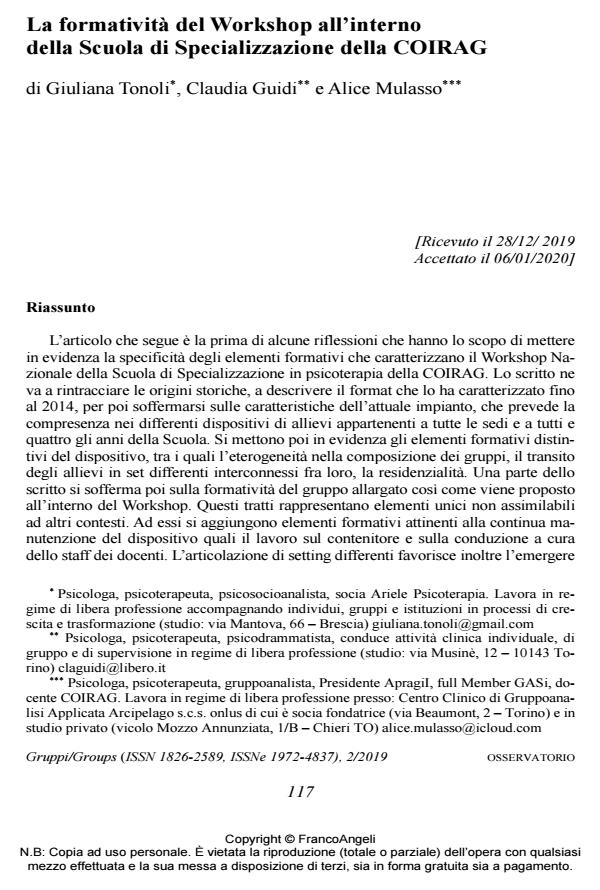The COIRAG Workshop as an essential part of the COIRAG Institute training pro-gram
Journal title GRUPPI
Author/s Giuliana Tonoli, Claudia Guidi, Alice Mulasso
Publishing Year 2020 Issue 2019/2 Language Italian
Pages 19 P. 117-135 File size 311 KB
DOI 10.3280/GRU2019-002013
DOI is like a bar code for intellectual property: to have more infomation
click here
Below, you can see the article first page
If you want to buy this article in PDF format, you can do it, following the instructions to buy download credits

FrancoAngeli is member of Publishers International Linking Association, Inc (PILA), a not-for-profit association which run the CrossRef service enabling links to and from online scholarly content.
The following paper is the first of a series of contributions with the aim of highlighting the value of the National Workshop as an essential part of the COIRAG advanced training program in psychoanalytic psychotherapy. After a brief survey of its historical origins and a description of its format from its incep-tion till 2014, the authors describe the Workshop’s current formula which foresees participation of all trainees - 1st to 4th year included - attending the COIRAG insti-tute in five centres across Italy. Special mention is made of all distinctive elements of this training device: among others, heterogeneity in group formation; the pos-sibility for trainees to experience different and yet intertwined settings; its residen-tial setting. A section of this paper is devoted to highlighting the training value of the enlarged group as proposed in the Workshop program. All these traits are unique and cannot be compared to any other training context. Mention is made of further training elements which are peculiar of the ongoing Workshop mainte-nance, such as continual attention to the holding environment and conduction by the professors’ team. Experiencing different settings favours the emergence of themes, phenomena and dynamics linked to social and cultural aspects, thus offer-ing the chance to explore the meaning of citizenship (being citizens of the COIRAG training community) and the social unconscious. In this paper, special attention is given to the first emerging theme that characterized past Workshop editions: technology.
Keywords: Workshop, Training, Experiential setting, Enlarged groups, Social context.
- Bauleo A. (1978). Ideologia, gruppo, famiglia. Milano: Feltrinelli.
- Bion R.W. (1961). Esperienze nei gruppi. Roma: Astrolabio, 1997.
- Biung-Chul Han (2015). Nello sciame. Visioni del digitale. Milano: Nottetempo.
- Bleger J. (1989). Psicoigiene e psicologia istituzionale. Molfetta: La Meridiana, 2011.
- Cantarella G., Corino U., Galletti A. e Ruvolo G. (1995). Un setting per lo scambio professionale. Gruppi e Istituzioni, X, 3-4: 118-131.
- Cianconi P. (2011). Addio ai confini del mondo, per orientarsi nel caos postmoderno. Milano: FrancoAngeli.
- Corino U. (1999). I Workshop Nazionali della Scuola di Psicoterapia COIRAG. Considerazioni sul primo ciclo. Gruppi, I, 2: 95-110.
- De Maré P., Piper R. e Thompson S. (1991). Koinonia. Dall’odio, attraverso il dialogo, alla cultura nel grande gruppo. Roma: EUR, 1996.
- Druetta V., Gonella R., Mignosi G., Profita G. e Ruvolo G. (2014). La formazione esperienziale degli psicoterapeuti attraverso la valutazione del Workshop residenziale COIRAG. Gruppi, XV, 3: 43-65. DOI: 10.3280/GRU2014-00300
- Foulkes S.H. (1948). Introduzione alla psicoterapia gruppoanalitica. Roma: EUR, 1991.
- Ghilardi A. (2003). Formarsi alla psicoterapia. In: Ronchi E. e Ghilardi A., a cura di, Professione psicoterapeuta. Il lavoro di gruppo nelle istituzioni. Milano: FrancoAngeli.
- Hopper E. (2003). Traumatic Experience in the Unconscious Life of Groups. The Fourth Basic Assumption: Incohesion: Aggregation/Massification or (ba) I:A/M. London: Jessica Kingsley.
- Hopper E. & Weinberg H. (2017). The Social Unconscious in the Persons, Groups, and Societies. Vol. 3: The Foundation Matrix Extended and Re-configured. London: Karnac.
- Jaques E. (1970). Lavoro, creatività e giustizia sociale. Torino: Boringhieri, 1978.
- Kaës R., Bleger J., Enriquez E., Fornari F., Fustier P., Roussillon R. e Vidal J.P. (1988). L’istituzione e le istituzioni. Milano: Raffaello Cortina, 1991.
- Pagliarani G. (1985). Il coraggio di Venere. Antimanuale di psico-socio-analisi della vita presente. Milano: Raffaello Cortina.
- Pichon-Rivière E. (1977). Il processo gruppale. Loreto: Lauretana, 1985.
- Profita G. e Ruvolo G. (2008). Pensare i dispositivi dei gruppi mediani e allargati. Gruppi, X, 2: 109-122.
- Profita G., Ruvolo G. e Lo Mauro V. (2007). Transiti psichici e culturali. Milano: Raffaello Cortina.
- Ronchi E. e Ghilardi A., a cura di (2003). Professione psicoterapeuta. Il lavoro di gruppo nelle istituzioni. Milano: FrancoAngeli.
- Turquet P. (1975). Minacce all’identità nel gruppo allargato. In: Kreeger L., a cura di, Il gruppo allargato. Roma: Armando, 1978.
Giuliana Tonoli, Claudia Guidi, Alice Mulasso, La formatività del Workshop all’interno della Scuola di Specializzazione della COIRAG in "GRUPPI" 2/2019, pp 117-135, DOI: 10.3280/GRU2019-002013